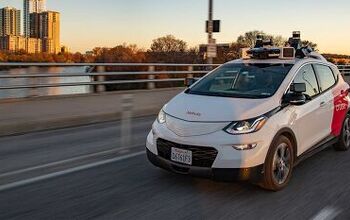Privacy Concerns By Auto Lenders Shape SEC Asset-Backed Security Rule
It took four years, but the Securities and Exchange Commission has put the final touches on a rule regarding asset-backed securities — including auto loans and leases — and what information is given when a company or investor takes on an ABS.
Juan Barnett of DC Car Geek reports the work on the rule began in 2010, re-proposed with the inclusion of Dodd-Frank Act requirements in 2011, and brought up for consideration again earlier this year. Barnett adds that a total of 240 comments — the majority from financial institutions — were submitted to the SEC in the same period.
As far as the automotive finance industry goes, a consortium dubbed Vehicle ABS Sponsors delivered a 97-page comment in 2012, bringing up numerous concerns about the rule.
One concern in particular focused on privacy issues. Were the then-proposed framework to be enacted, the consortium feared competitors from within and outside the ABS market would use the massive amounts of data collected by its members to upend the industry as a whole:
Ordinarily, we would consider someone appropriating our data to be wrongfully taking our private property and harming us in the marketplace. We think it is highly inappropriate for a government-mandated program to permit, and indeed facilitate, this practice.
Earlier this year, SEC Commissioner Michael Piwowar acknowledged those and similar concerns, suggesting those who do participate in the ABS market “simply follow the statute and require disclosure of asset-level data only if such data is necessary for investors to independently perform due diligence.”
Thanks to a rule modification regarding the sharing of loan-level data, both sides of the ABS game — issuers and investors — can use a private database to talk amongst themselves. Previously, the data would have been made readily available through the SEC’s public database, EDGAR.
Seattle-based writer, blogger, and photographer for many a publication. Born in Louisville. Raised in Kansas. Where I lay my head is home.
More by Cameron Aubernon
Latest Car Reviews
Read moreLatest Product Reviews
Read moreRecent Comments
- Ltcmgm78 It depends on whether or not the union is a help or a hindrance to the manufacturer and workers. A union isn't needed if the manufacturer takes care of its workers.
- Honda1 Unions were needed back in the early days, not needed know. There are plenty of rules and regulations and government agencies that keep companies in line. It's just a money grad and nothing more. Fain is a punk!
- 1995 SC If the necessary number of employees vote to unionize then yes, they should be unionized. That's how it works.
- Sobhuza Trooper That Dave Thomas fella sounds like the kind of twit who is oh-so-quick to tell us how easy and fun the bus is for any and all of your personal transportation needs. The time to get to and from the bus stop is never a concern. The time waiting for the bus is never a concern. The time waiting for a connection (if there is one) is never a concern. The weather is never a concern. Whatever you might be carrying or intend to purchase is never a concern. Nope, Boo Cars! Yeah Buses! Buses rule!Needless to say, these twits don't actual take the damn bus.
- MaintenanceCosts Nobody here seems to acknowledge that there are multiple use cases for cars.Some people spend all their time driving all over the country and need every mile and minute of time savings. ICE cars are better for them right now.Some people only drive locally and fly when they travel. For them, there's probably a range number that works, and they don't really need more. For the uses for which we use our EV, that would be around 150 miles. The other thing about a low range requirement is it can make 120V charging viable. If you don't drive more than an average of about 40 miles/day, you can probably get enough electrons through a wall outlet. We spent over two years charging our Bolt only through 120V, while our house was getting rebuilt, and never had an issue.Those are extremes. There are all sorts of use cases in between, which probably represent the majority of drivers. For some users, what's needed is more range. But I think for most users, what's needed is better charging. Retrofit apartment garages like Tim's with 240V outlets at every spot. Install more L3 chargers in supermarket parking lots and alongside gas stations. Make chargers that work like Tesla Superchargers as ubiquitous as gas stations, and EV charging will not be an issue for most users.































Comments
Join the conversation
I've long felt that there is nothing fundamentally wrong with the idea of asset-backed securities. The problem is how to implement accurate assessments of the risk thereof. Which brings us to the fundamental conflict: A truly accurate assessment of risk made available to everyone would lower the profits made by the firms creating and trading them. It's the paradox of the information-rich age. With complete data and good analysis, an ABS can be accurately valued at any time. This would remove the edge that some have. This, I think, is the real reason for the resistance to divulging any information about the underlying assets.
"We don't want you to watch what we're doing because technically if we're doing wrong it's still on you to find out!" Interesting argument and I imagine amongst the hard-core objectivists out there it holds water but in the reality of a financial backed economy like we have today watching over industry giants with trillions in assets is a normal and accepted management option. The argument that it would be free to the public to use and abuse is a bit much, in a technical sense, yes the data would be accessible through EDGAR but even if rivals were to spend the manpower to review it it wouldn't necessarily gleam intel that wouldn't have been available through any good consulting firm. This is more so a case of trying to keep the prying eyes of watch dog groups off them. It isn't that the watch dog group can't buy into the database (as the rule changes wouldn't prohibit them from buying stock to view it) but it would prohibit them from publicizing it without going into questionable legal territory. Any attempt to stymie the public's knowledge of misappropriation by business is a crime against all of us.